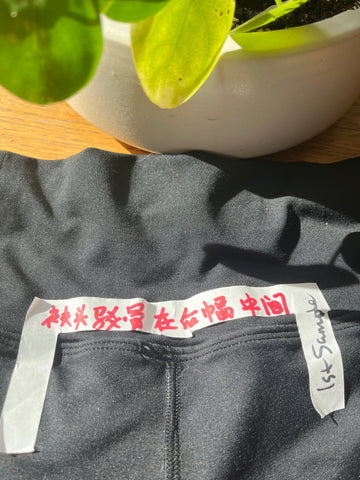We care about ethical manufacturing. We are taking you behind the scenes and sharing about some of our wins, struggles, and goals
Our products are made in East Bay factories, including Edward’s small factory in Oakland. There are many reasons why I chose to make Chickfly pants locally. 1) Quality Control, 2) California Labor Laws, and 3) Reduced Carbon Footprint for transportation.
From the Founder —
When I first visited this factory two years ago, I noted things, like, there are about 25 sewing stations, the radio was tuned to a Chinese station, there was a giant air filter, and the factory is in a single story building. The doors were open on either end, so people could see the light and get outside easily for a break. There was good lighting. The sewists were women.
There were stacks of pre-cut textiles on the floor, shelves, and tables. It didn’t look like one of those “fair trade” or "sustainable fashion" photos you see in which the expansive sewing tables were clear and clean and the warehouse was designed in post-modern, Scandinavian efficiency. It was messy, industrial, busy and efficient. There were projects everywhere with colorful threads and lent and piles of fabric.
It made me wonder if those photos I see are real. That said, it looked safe, and there was a familial feeling. When I got the first shorts sample back, it looked like this:

My products are not made in China, they are made by extremely skilled Chinese women in California. Chickfly pants are not easy to make, believe me! I work with Eloisa Serrano of Bay Thread and she contracts with local manufactures capable of complex designs.
After visiting the factory I decided to look into the history of the Bay Area garment industry. It started during the gold rush with Levis. Free Trade Agreements contributed to it's demise in the late 1990s. Only about 30% of jobs making garments remain.
Chinese slavery started in California around this time as well. Chinese workers have dominated our local garment manufacturing industry since its inception. In the Bay Area, the confluence of multiple port cities, a rich history of Chinese, African American, and Latino people are just a few of the ethnic groups that bring diversity and culture to the City. Chickfly pants are most likely manufactured on Ohlone and Miwak lands.
In Ukiah, Chickfly's home, Chinese, Pomo, and Latino peoples help create a colorful small-town cultural fabric. I am from one of the many, European immigrant families that came here and I am thankful to have had Mendocino county as home. My hope is that I can someday give back to these communities, through Chickfly, in a meaningful way.
When the Free Trade agreements happened, the Bay Area manufacturing industry crashed as companies like Gap and Esprit went overseas. Today the industry is a fraction of the size it used to be, and 70% of those workers laid off were not able to find new employment. This was due to a lack of the English Language and alternative skills (according to a UC Berkeley report).
I feel good about hiring local manufacturers. I know that some of the things that cause loss of life in the garment industry are better here: air filtration and fire risks are mitigated in California.The people that sew our pants should be paid more than $15 an hour. I am both thankful that Bay Area minimum wage is better than most places and also aware that the cost of living is higher. I want the people that make Chickfly pants to be paid a living wage. That said, the price of Chickfly pants are already too high for many people, and thus far I am still working at Chickfly without getting paid myself and every time I make a new product I still have to subsidize it. This is a marathon, not a sprint. I am glad you all are on my team.
My goal of sustainable fashion is a practice, not something I am capable of doing perfectly. I hope that, once I start selling more pants, I will be able to insure that the workers see a pay increase. I am a long way from having that power.
Today we focus on the small things. For example, another struggle I have is with packaging. We need a special, extra-sticky label and couldn’t find it anywhere except Amazon and Walmart, two places where I try not to shop. I postponed and just used tape for months, not wanting to give in to purchasing from these companies that treat their workers poorly. I finally found a company operated by blind people, BuyLCI, that carries them. I was stoked for this win. I have more eco-friendly package solutions in the works.
If you want to help us have more power to ethically produce your clothing, please share Chickfly with your friends, post about us, and send us photos and videos that we can re-post. Thanks so much for your support!










0 comments